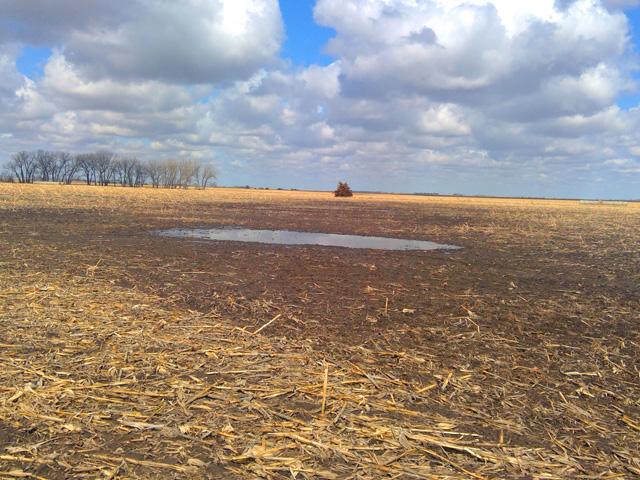SD Farmer Asks for Court Ruling v USDA
South Dakota Farmer Motions Federal Court to Rule in His Favor in Ongoing Clean Water Act Case
LINCOLN, Neb. (DTN) -- Minor County, South Dakota, farmer Arlen Foster asked a federal court on Monday to rule in his favor in an ongoing wetlands lawsuit filed against USDA.
Foster's lawsuit alleges the agency unlawfully refused to reconsider a wetlands determination when he presented new evidence in 2020 that may have proven the land in question was not a wetland.
For years, USDA has maintained that a puddle in the middle of one of Foster's fields is a wetland.
Foster filed a motion for summary judgment this week with the U.S. District Court for the District of South Dakota. Summary judgement is entered by a court for one party and against another without a full trial. Summary judgments may be issued on the merits of an entire case or on discrete issues.
In November, USDA asked the court to either grant summary judgement in its favor or dismiss the case outright.
Foster has been battling USDA's wetland determination on an 0.8-acre tract of land since 2008. USDA declared it a wetland in 2011 based on an agency process, and Foster convinced the Supreme Court to review the determination.
New evidence emerged in 2020 showing a tree belt installed on his farm by his father in 1936 is what has caused massive snow piles in the field. The yearly spring melt has created a perpetual puddle.
Foster presented the evidence to USDA in April 2020, but the agency declined to update its 2011 determination. Because he's unable to drain water from the land, Foster hasn't been to farm the ground consistently.
P[L1] D[0x0] M[300x250] OOP[F] ADUNIT[] T[]
USDA attorneys said in a recent court filing Foster had not pursued all administrative remedies prior to filing the lawsuit.
Under Swampbuster Act provisions, Foster is allowed to farm the land but cannot drain water from the site because it is deemed to be a wetland.
Attorneys for Foster said in court documents the agency "unlawfully withheld agency action" by not considering the new evidence.
"Under Swampbuster's terms, the 2011 certification 'remains valid and in effect as long as the area is devoted to an agricultural use or until such time as the person affected by the certification requests review of the certification by the secretary,'" Foster's Pacific Legal Foundation attorneys said in a memorandum supporting his latest motion.
"In other words, under 'the plain language of the statute any person subsequently affected by an existing wetland determination may invalidate the existing certification by requesting review of the certification by the secretary. There is no jurisdictional bar to this court enforcing Swampbuster's language and holding that defendants must review the 2011 certification."
Because of the determination that the field is a wetland, Foster would not be eligible for farm programs if he made changes to the land to drain the standing water.
According to the lawsuit, Foster's mud puddle does not dry out at the same pace as surrounding fields because it receives additional snow melt from a tree belt. In about half of those years, the mud puddle dries out soon enough that its soil also is dry enough to support the use of farm equipment.
Foster's technical report to USDA in 2020 as part of a requested review of the 2011 certification demonstrates the mud puddle was created "incidentally to the development of the tree belt and is therefore an 'artificial wetland,'" the lawsuit said.
That information was not available to the Fosters or USDA ahead of the 2011 wetland certification.
Foster's lawsuit alleges the Swampbuster Act is unconstitutional because it "regulates every wetland in the United States of America, however small, however ephemeral, and however distant or unconnected from any other water body, so long as it is on a farm."
Foster previously argued unsuccessfully in court that the Natural Resources Conservation Service deprived him of his rights by deeming his land was similar to a known wetland 33 miles away.
In July 2008, Foster asked the NRCS to reconsider an earlier wetland delineation it performed, according to a petition he filed with the Supreme Court. Foster continued to challenge NRCS through a series of court cases, eventually losing in an appeal to the U.S. Court of Appeals for the Eighth Circuit in St. Louis in April 2016.
Read more on DTN:
"USDA Motions to Dismiss Wetlands Case," https://www.dtnpf.com/…
Todd Neeley can be reached at todd.neeley@dtn.com
Follow him on Twitter @DTNeeley
(c) Copyright 2022 DTN, LLC. All rights reserved.




